William J. George – New York War Veteran, Carpetbagger & Harrisburg Publisher
Posted By Norman Gasbarro on January 20, 2016
At the death of Captain William J. George on 24 September 1911 in Harrisburg, the following obituary appeared in the Harrisburg Telegraph:
CAPT. GEORGE, WAR VETERAN, IS DEAD
Was Secretary of Soldier’ Orphans’ School Commission
CAPTAIN WILLIAM J. GEORGE
After a long illness Captain William J. George, aged 64 years, chief clerk to the Soldiers’ Orphan’ Schools Commission, died last night at his residence, 1001 North Second Street.
Captain George was born and educated in Albany, New York, and at the outbreak of the Civil War enlisted and served as correspondent for several newspapers, afterward taking a conspicuous part in the Lincoln-McClellan campaign.
Locating in Richmond after the war, Captain George became active in politics and served as chairman of the Republican city committee. Removing to Harrisburg in 1877, he became affiliated with the silk industry of New London and later was one of the firm of George and Farnum, proprietors of the News, a defunct newspaper of this city.
Thomas G. George, former Chief of Police and at present a candidate for Recorder, is a son.
The funeral will be held Wednesday afternoon. Arrangements have not been completed.
Two days later, a report on the funeral appeared in the same newspaper:
Funeral Services for Capt. Wm. J. George
The funeral services of Captain William J. George, aged 64, who died Sunday night, were held this afternoon at the home of his son, Thomas G. George, 1001 North Second Street. The services were in the charge of the Rev. John D. Fox, pastor of Grace Methodist Church. The funeral was attended by officers of the Soldiers’ Orphan School Commission, of which he was chief clerk. [From: Harrisburg Telegraph, 27 February 1911].
William J. George was profiled in the Commemorative Biographical Encyclopedia of Dauphin County, which was published in 1896:
William J. George, of the firm of George & Farnum, sole proprietors and publishers of The News, was born in Albany, New York, 6 August 1847. He was educated in the public schools and private academies of that city. At the age of sixteen years he entered the Union Army and served until the close of the Civil War, being finally mustered out in July 1865.
During the war, Captain George was correspondent in the field for several newspapers, among them being the well-known Albany Journal. He took an active part in the campaign of the Army of the Potomac, although not a voter, in the memorable Lincoln-McClellan presidential contest in 1864. He distributed thousands of pamphlets and circulars on which were printed the platforms of the parties. These circulars had as much as any one other agency to do with the large Lincoln vote, owing to the stand taken by the Republicans on the war, and the neglect of the Democrats to uphold the Union, and their declaration that “the war was a failure.”
At the close of hostilities the Captain settled in the South and for many years was located in Virginia, where he took an active part in politics, being chairman of the Republican City Committee of Richmond when he left there in 1877 for Harrisburg. In Richmond he was connected with various newspapers, and also acted as special correspondent for a number of northern newspapers during reconstruction days. His letters at that period were very interesting, owing to the great efforts to make the South solid for Democracy – no matter what the means used.
Since Captain George resided in this city — up to 1 July of this year — he was connected with the Brainerd & Armstrong Company, the celebrated manufacturers of New London, Connecticut. His son, Thomas G. George, took his place with the above company on that date in order to allow Captain George to give his undivided time and attention to The News.
The Captain served the city as councilman in both branches and is one of its most active and progressive citizens. He has been and is connected with a number of leading enterprises and is an up-to-date business man. He is a member of a number of organizations and a leader in the Republican politics of the State capital.
He was married at Albany, New York 20 January 1867, to Miss Annie Henley, daughter of Robert Henley and Jennie Henley, of Albany, where Mrs. George was born. To their union have been born two children, Thomas G. George and Jennie B. George, both residing in Harrisburg. He also has two grandchildren residing with him, Annie M. Goodwin and Gertrude Goodwin. The father of Mr. George is deceased; his mother still survives and resides in Binghampton.
The term “carpetbagger,” although considered pejorative, referred to northerners who went South during the reconstruction period, mostly with a desire for personal gain and/or for the purpose of assisting in bringing democracy to the region. In the case of William J. George, his biographical sketch suggests that his motives were the latter rather than the former – although his departure from the South in 1877 did coincide with the end of the reconstruction period – perhaps indicating that his safety may have been in danger when the Federal troops were withdrawn because of actions he took against local populations. His letters, referred to in the biographical sketch, may give some indication as to some of the “means” used to make the South comply and the extent to which he took part in them. Those letters were not consulted in writing this blog post.
It is not known why he chose to settle in Harrisburg.
Neither the obituary nor the biographical sketch give a description of the actual military service of William J. George – except to say that he served from the time he was sixteen until the close of the war. The “New York Military Abstract Card” (shown above from Ancestry.com), notes that on 10 February 1864, he was mustered into service as a Private in Company M, 50th New York Engineers, and served until his discharge on 13 June 1865 at Port Berry, Virginia. At the time of his enrollment, he was working as a gardener, was 5 foot, 4 inches tall, had brown hair, blue eyes and a fair complexion. At the time of the writing of this blog post, it was not known how and why William J. George obtained the rank of “Captain.”
That the 50th New York Engineers was the only Civil War service located for William J. George, is confirmed by the Pension Index Card (shown above from Fold3). On 29 July 1904, he applied for pension benefits, which he received and collected until his death. On 29 September 1911, his widow applied and received benefits which she collected until her death.
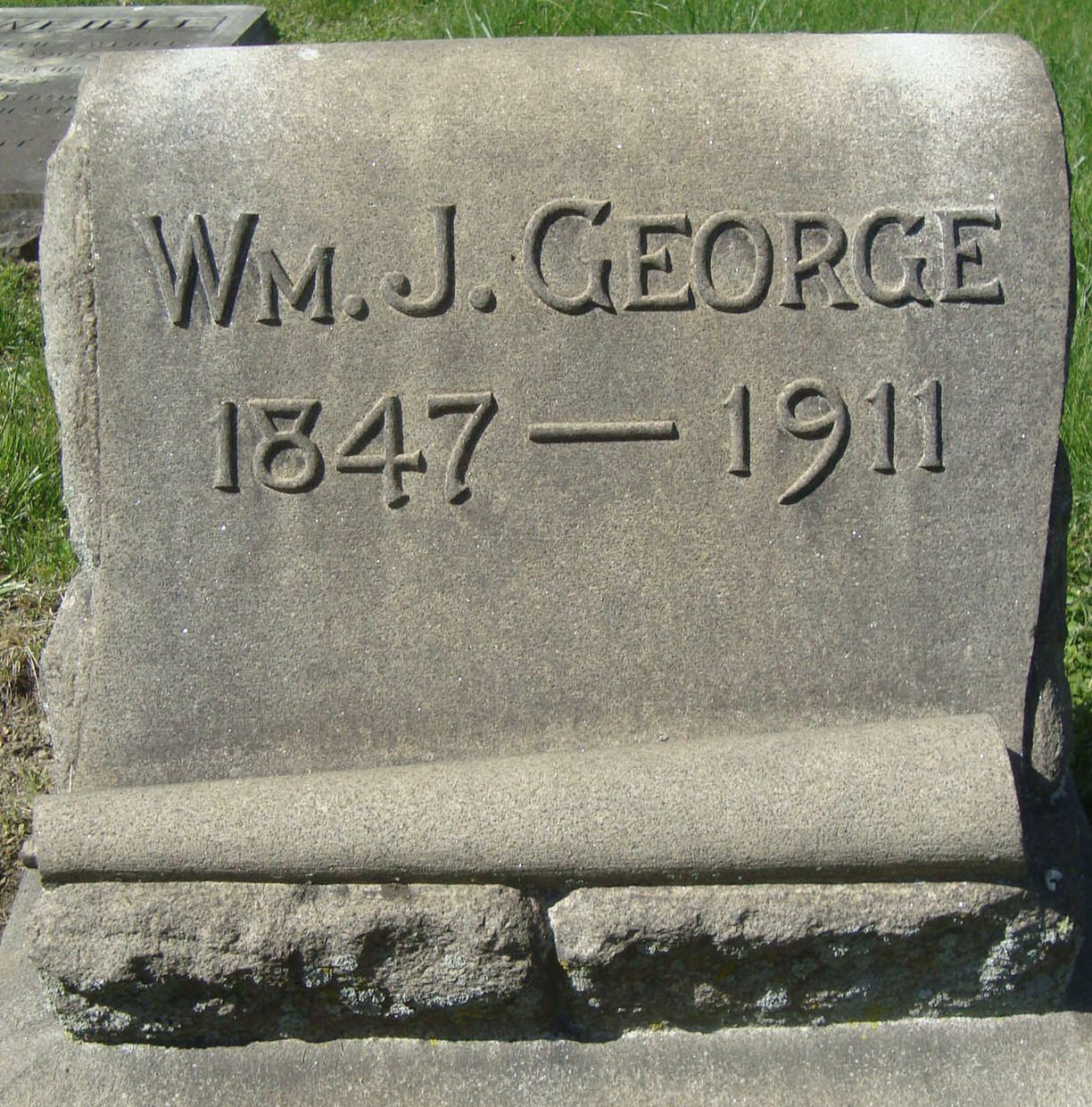
William J. George is buried at the Paxtang Cemetery, Paxtang, Dauphin County. His Findagrave Memorial, as of this blog post writing, needs to be updated to include information on his Civil War service.
For more information on the 50th New York Engineers, see the post entitled The 50th New York Engineers at Gettysburg, although the dates of service for William J. George do not include the Gettysburg Campaign.
——————————
News clippings are from Newspapers.com.
 ;
;
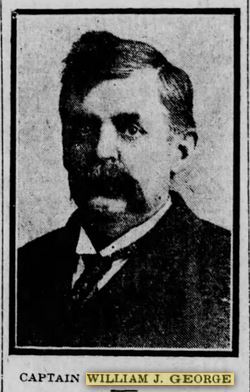
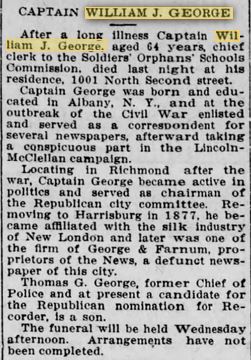
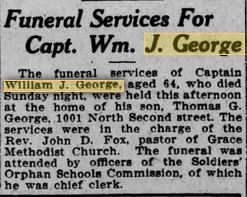
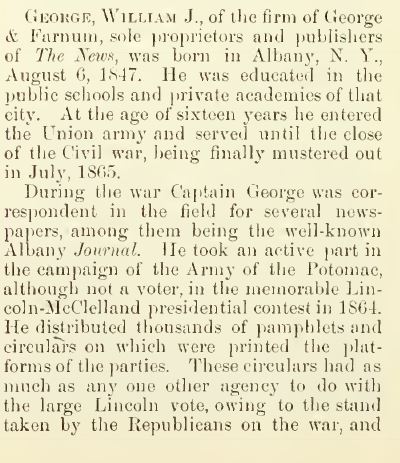
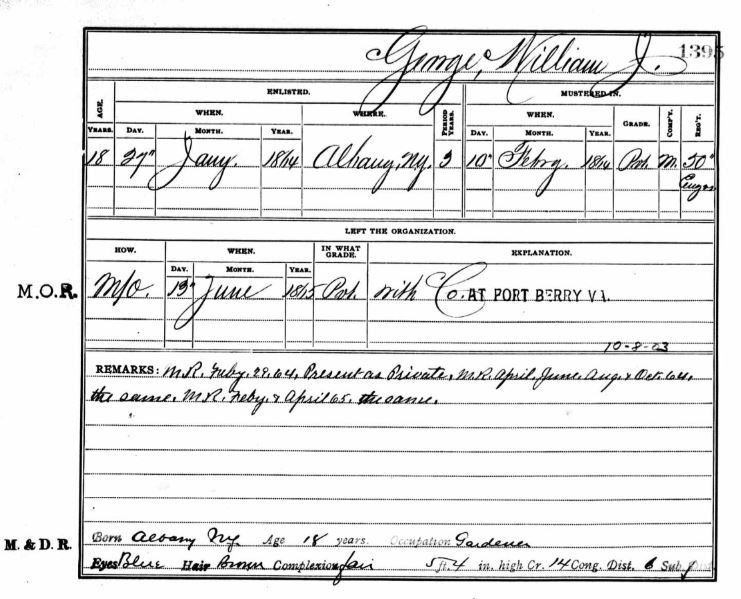
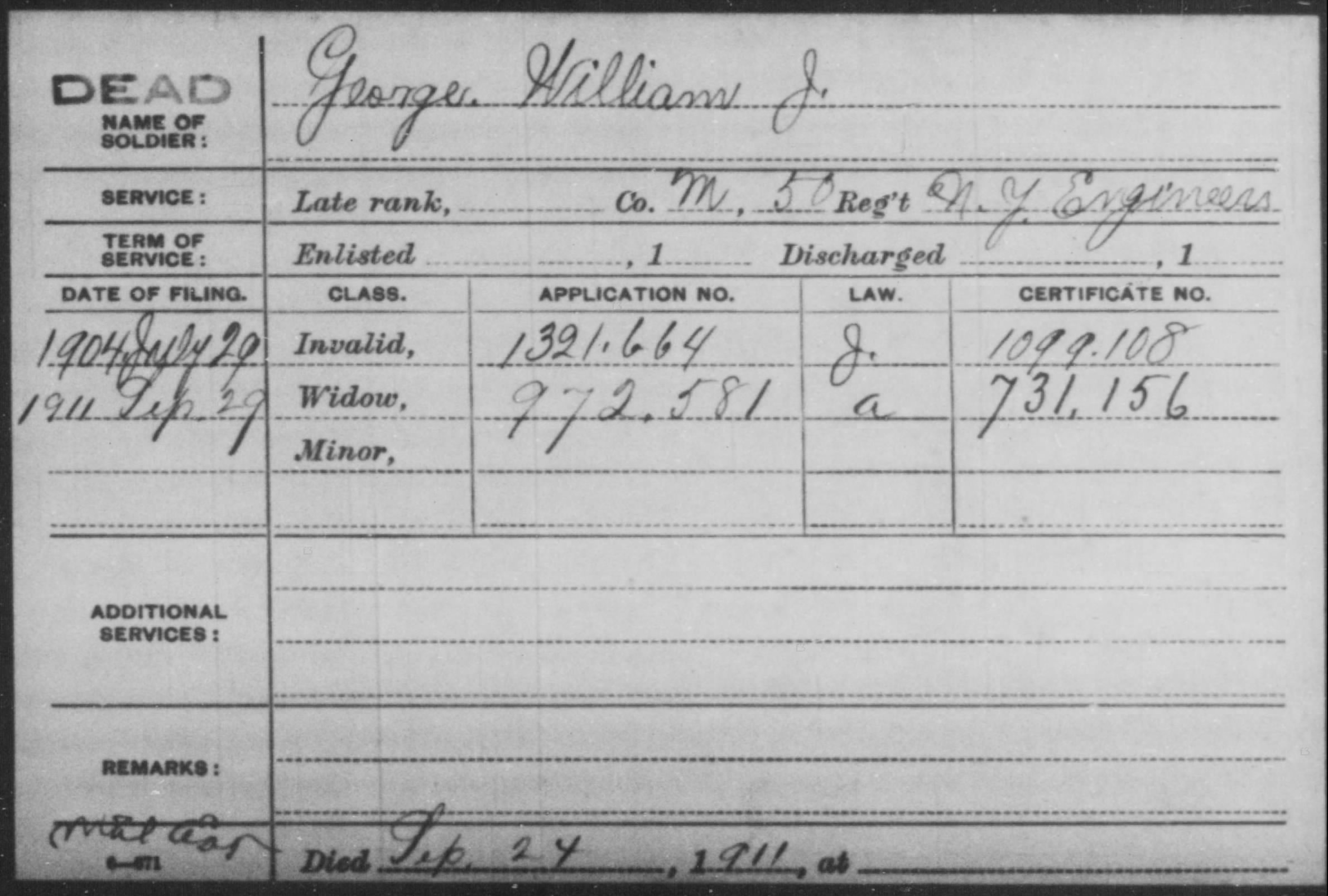


Comments